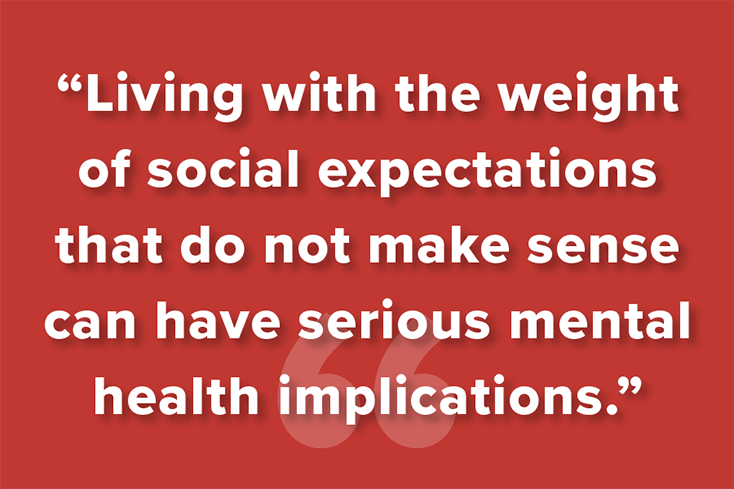July 14, 2022
By Brooke Coonrod

As an autistic person, I have always felt different than most, but this gap only became more apparent as I grew older and social expectations became more concrete. For many people with autism, social constructs and behavioral norms are confusing; they often do not feel important or applicable to our lives. Living with the weight of social expectations that do not make sense, I have found, can have serious mental health implications.
Many of us living with autism are left feeling trapped when our instincts and behaviors don’t fit into the narrow confines of what is deemed “normal.” Children, teens and young adults are already at an increased risk of having suicidal thoughts and engaging in self-harm behaviors, and emerging research has shown that autistic youth may be at a greater risk — begging the question: “Why?”
Through my experience, I have learned that many therapies designed for people with autism emphasize the need to conform to “socially acceptable” behavior — to convert a person to fit a standard mold — rather than emphasize individual gifts and strengths. What does that approach teach a person? Arguably, this method suggests that they aren’t good enough the way they are, or that they aren’t worthy of being loved or accepted unless they mask their identity to appear more “normal.”
Last year, during my sophomore year of college, I began to feel extremely isolated, anxious and pressured. I didn’t see anyone like me around, and, for a while, I felt like I was the only autistic and neurodiverse person on my campus. As you can imagine, that took a toll on my mental and emotional well-being. It was around that time I decided to try therapy, and it was only then that I realized the harm therapy can have when it is not inclusive and intersectional.
My disability wasn’t recognized, despite my attempts to explain and efforts to provide the necessary paperwork that disclosed my diagnosis. I was told that my behavior was a “dysfunction of my personality,” which led to me spending a year learning to blame myself for my feelings and challenges. I learned to mask my unique identity to be accepted by my family and peers. I was discouraged from my harmless and unique interests that may appear too "childish" for others to accept. I completely lost myself trying to reach out for help, and there came a point when therapy was causing me more harm than good — but I had been trained to believe I was the problem.
Recently, I began to reading books and articles written by women with autism, and it was at that point when I didn’t feel so alone. I connected with other autistic women on social media and through advocacy groups. Through these communities, I learned that I am good enough just the way I am. My personality isn’t flawed; rather, our limited system that ignores the positives of neurodiversity is the problem.
Practitioners themselves aren’t to blame, as they are products of a field that has not appropriately prepared them. Many courses and college curriculums lack neurodiverse people's perspectives and experiences, which in many cases, leaves therapists and professionals in the field unprepared to work with clients with this disability that has such a diverse and unique spectrum.
Ultimately, I am on the journey of self-acceptance and mental well-being, but I know that some people won’t be as lucky. My neurodiversity and disability limited my access to quality mental health treatment, and I see this becoming a greater concern. I hope to spread the message that the “cure” to autism is acceptance. I wish I had learned that sooner.
We’re always accepting submissions to the NAMI Blog! We feature the latest research, stories of recovery, ways to end stigma and strategies for living well with mental illness. Most importantly: We feature your voices.
LEARN MORENAMI HelpLine is available M-F, 10 a.m. – 10 p.m. ET. Call 800-950-6264,
text “NAMI” to 62640, or email. In a crisis, call or text 988 (24/7).